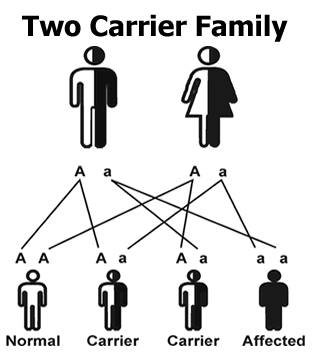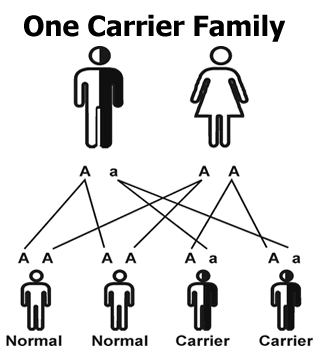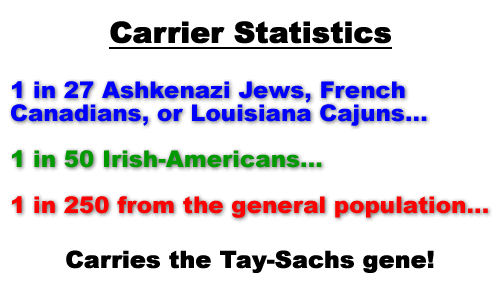US Tax Deductible EIN: 26-0256621
 - (562) 212-1071
- (562) 212-1071
 - 2409 E. Luke Avenue Phoenix AZ 85016
- 2409 E. Luke Avenue Phoenix AZ 85016
A person can only be affected by Tay-Sachs Disease when two carrier parents pass a Hex-A gene mutation to their child. When two-carrier parents have children, three outcomes are possible.
As we look at these four possible outcome there is a 25% chance both parents do not pass the gene mutation to the child; a 50% chance one of the parents passes the gene mutations; and a 25% chance both parents pass the gene mutation. See the chart below:

If only one of the parents is a carrier of the Tay-Sachs gene mutation then only two outcomes are possible:
A one-carrier family has a 50% chance that no gene mutation is passed and the children are not carriers and a 50% chance the gene mutation is passed and the child is a carrier. A one-carrier family cannot have an affected child. See chart below:

The groups most at risk are eastern Europeans of (Ashkenazi) Jewish decent, French Canadian living near the St. Lawrence River and Louisiana Cajuns. In these populations statistics show that one in every 27 people carried a Tay-Sachs gene mutation. The next highest at risk population is people of Irish-American decent. The carrier rate in that population is one in 50 people carry the Tay-Sachs gene. And finally for everyone in the general population studies have shown there is a one in 250 chance that you carry the Tay-Sachs gene. In the US alone there are over 1.2 million Tay-Sachs carriers and the vast majority of those people have never heard of the disease.

One of the most insidious features of Tay-Sachs disease is it often strikes families with no prior history of the disease. Large and diverse family trees allow the carriers of the Tay-Sachs disease to go without expression for generations until unexpectedly a child is diagnosed and the family submits to carrier testing.
A simple blood test can distinguish Tay-Sachs carriers from non-carriers. Blood samples can be analyzed by either enzyme assay or DNA studies. The enzyme assay is a biochemical test that measures the level of Hex-A in a person's blood. Carriers have less Hex-A in their body fluid and cells than non-carriers. The NTSAD (referenced below) maintains a listing of certified carrier screening locations - this is not a blood test every hospital is equiped to preform.
Since there is currently no treatment or cure for Tay-Sachs disease, it is important that couples in high risk groups undergo genetic testing to determine if they are carriers.
There are pre-natal tests that can be preformed to see if a fetus is affected by the Tay-Sachs disease, but there is no treatment for affected fetuses.
For more information about Tay-Sachs disease and carrier testing:
The Cure Tay-Sachs Foundation is very grateful you decided to donate and we thank you for your generosity. Your donation will be used to support research to find a cure for Tay-Sachs disease.
The Cure Tay-Sachs Foundation is exempt under Section 501(c)(3) of the Internal Revenue Code, making this gift tax deductible to the fullest extend permitted by law.
Please click the PayPal button to make a donation today! You can donate using a credit card - without a paypal account - by following the instruction on the paypal system (lower left). Or, if you prefer, please send your donation (payable to the Cure Tay-Sachs Foundation) to the address below.